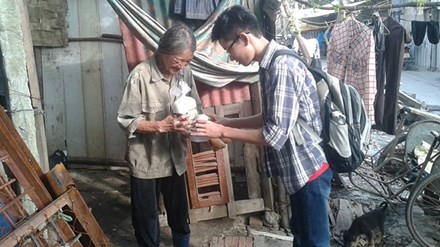(VOVworld) – Every Wednesday and Saturday, members of ‘A better Hanoi’ project gather at a number of restaurants in the city to collect the food not used in local restaurants and hotels, package them, and deliver them to needy people. For these young people, the weekend is not time for relaxing after hard days at university or college, but for the project.
 |
A poor woman living under Long Bien Bridge offered the food from the project.
(Photo: dtinews.vn) |
Founded in August 2013 by a group of Hanoi’s students, the community project is based on the World Bank’s Global Food-bank concept.
The beneficiaries mostly live in poor residential areas, under bridges, and by the Red River or are disabled children at care centres.
So far, thousands of free meal packages have been provided to disadvantaged and homeless people.
Dinh Ngoc Thuy, a project member, says that they “provide food at five centers for the disabled, disadvantaged, children, and a number of those living under Long Bien Bridge. It’s very wasteful when restaurants or households throw away a great volume of leftover food which will also pollute the environment. Meanwhile right here in Hanoi there remain many people who need sufficient daily meals to work. In pursuit of this purpose, we’ve launched this campaign.”
Project members have made contacts with local restaurants, supermarkets, and cake shops in Hanoi to call on them to contribute their leftover food which is still edible and is still hygienic and safe. They then reprocess it, maintain it, and distribute it to poor people in the capital.
Nguyen Thi Thuy Dung, the project’s leader, said that “the project ‘A Better Hanoi’ has three departments. The foreign relations department is in charge of contacting restaurants, hotels, and food suppliers to call for sponsorship. The research and development department focuses on finding beneficiaries, monitoring food distribution, and the communications department. With this apparatus, the project operates very smoothly.”
With only five members at the start, the number now has grown to 30 with more than 300 volunteers.
The food bank model is quite common in many countries, but it remains a new concept in Vietnam, so the project initially faced difficulties due to a lack of co-operation by local restaurants, and doubts by the local authorities' about the quality of the food. The members had to take photos of their distribution process to persuade the restaurants that their food was actually given to the poor.
Overcoming these difficulties, the project has gradually become popular with social activities like “Warm Winter, Full Spring 2014” and “Save food – Save the Earth.”
To date, it has offered food to over 600 people and worked with 36 restaurants, four of which have committed to long-term cooperation.
Le Minh Hoang, manager of the Green Lotus Hotel, has been with the project from the earliest days.
Hoang said he’s “mobilized other restaurants to participate in the project. The food my restaurant donates to the program will partly help needy people to have a better life. I think the move is meaningful.”
A better Hanoi has organized an event called ‘Online photos – What I see’ with the hope that everybody can share stories about disadvantaged people for the project and encourage others to discover and assist them.
Pham Thi Linh, who has carried fruits at Long Bien wholesale market for over the past 30 years, lives with two children in a thatched house by the Red River side. Linh is moved to say: “it’s said that a little help in misfortune is as good as a big one in fortune. It’s just a little food but I’m so moved and don’t know what to say. Although it has been dark, the young people still take care of us and bring food for us.”
Apart from voluntary activities to call for donations of food, the project members have mobilized restaurants and inns to make commitments to saving food in an attempt to develop good habits for all. Their bigger future plan is to set up the first food bank in Vietnam to offer a sustainable supply to the poor.